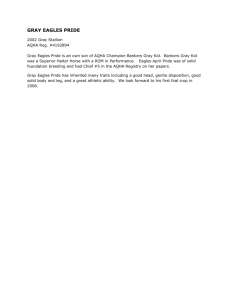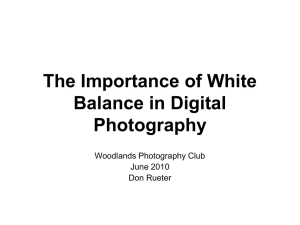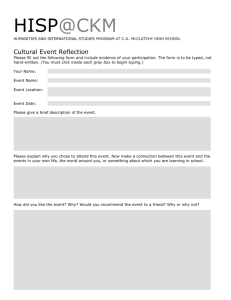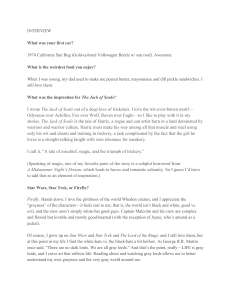John Gray is most known for his book Men are from Mars
advertisement
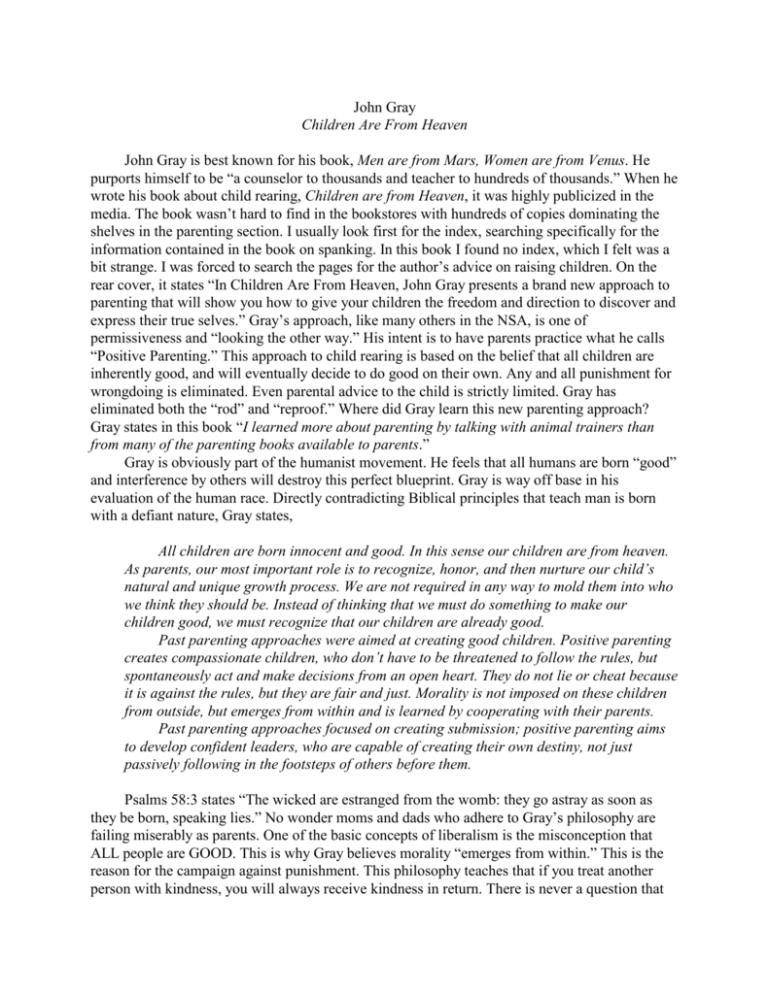
John Gray Children Are From Heaven John Gray is best known for his book, Men are from Mars, Women are from Venus. He purports himself to be “a counselor to thousands and teacher to hundreds of thousands.” When he wrote his book about child rearing, Children are from Heaven, it was highly publicized in the media. The book wasn’t hard to find in the bookstores with hundreds of copies dominating the shelves in the parenting section. I usually look first for the index, searching specifically for the information contained in the book on spanking. In this book I found no index, which I felt was a bit strange. I was forced to search the pages for the author’s advice on raising children. On the rear cover, it states “In Children Are From Heaven, John Gray presents a brand new approach to parenting that will show you how to give your children the freedom and direction to discover and express their true selves.” Gray’s approach, like many others in the NSA, is one of permissiveness and “looking the other way.” His intent is to have parents practice what he calls “Positive Parenting.” This approach to child rearing is based on the belief that all children are inherently good, and will eventually decide to do good on their own. Any and all punishment for wrongdoing is eliminated. Even parental advice to the child is strictly limited. Gray has eliminated both the “rod” and “reproof.” Where did Gray learn this new parenting approach? Gray states in this book “I learned more about parenting by talking with animal trainers than from many of the parenting books available to parents.” Gray is obviously part of the humanist movement. He feels that all humans are born “good” and interference by others will destroy this perfect blueprint. Gray is way off base in his evaluation of the human race. Directly contradicting Biblical principles that teach man is born with a defiant nature, Gray states, All children are born innocent and good. In this sense our children are from heaven. As parents, our most important role is to recognize, honor, and then nurture our child’s natural and unique growth process. We are not required in any way to mold them into who we think they should be. Instead of thinking that we must do something to make our children good, we must recognize that our children are already good. Past parenting approaches were aimed at creating good children. Positive parenting creates compassionate children, who don’t have to be threatened to follow the rules, but spontaneously act and make decisions from an open heart. They do not lie or cheat because it is against the rules, but they are fair and just. Morality is not imposed on these children from outside, but emerges from within and is learned by cooperating with their parents. Past parenting approaches focused on creating submission; positive parenting aims to develop confident leaders, who are capable of creating their own destiny, not just passively following in the footsteps of others before them. Psalms 58:3 states “The wicked are estranged from the womb: they go astray as soon as they be born, speaking lies.” No wonder moms and dads who adhere to Gray’s philosophy are failing miserably as parents. One of the basic concepts of liberalism is the misconception that ALL people are GOOD. This is why Gray believes morality “emerges from within.” This is the reason for the campaign against punishment. This philosophy teaches that if you treat another person with kindness, you will always receive kindness in return. There is never a question that someone could be selfish, destructive, or violent as long as you treat him or her kindly. This concept is behind the efforts to impose gun control (if good people can’t carry guns, then the bad people will quit carrying them too), along with the drive to eliminate the death penalty (if the government quits killing people, the bad people will quit killing too). Gray attempts to glorify this approach to child rearing, making his readers believe that positive parenting turns children into fearless warriors and “confident leaders” rather than “passive” doormats. There is one angle on human nature that this “expert” takes which was one that I had never encountered before. Most of the non-spanking advocates in the field of psychology have convinced their followers that any and all spanking down through the centuries has been harmful and counterproductive. Gray takes a slightly different approach. The author believes that spanking worked in the past, it just doesn’t work today. In the book Children are from Heaven, Gray begins his explanation of the modern day child in the section titled Children Today Are Different. He states, Just as the world today is different, our children are different. They no longer respond to fear-based parenting. The old fear-based approaches actually weaken a parent’s control. The threat of punishment only turns children against their parents and causes them to rebel. The intimidation of yelling and spanking no longer creates control, but simply numbs a child’s willingness to listen and cooperate. Punishment in the past was used to break a strong-willed child. Although it may have worked to create obedience, it doesn’t work today. Children are now more sophisticated and aware. They recognize what is unfair and abusive and will not tolerate it. They will resent and rebel. Most importantly, punishment and the threat of punishment break down the lines of communication. Instead of being part of the solution, you the parent become part of the problem. Threats have worked for centuries, but in a free society, fear-based parenting comes back to haunt us. The more parents use punishment, the more their children will rebel later. Many adults today can’t connect or don’t feel a desire to connect with their parents because they were punished. Here, Gray describes a theory seldom seen in the world of psychology. He states that human nature has changed. He admits that punishment in the past “worked to create obedience,” but is now coming back “to haunt us.” There is a reason why Gray is taking this approach. We all agree that in today’s society, parents are spanking their children less, yet there is more defiance than ever before. Rather than admit that less spanking has resulted in more discipline problems with children, Gray blames the increase in incorrigibility on a change in human nature. His claim that “Children are now more sophisticated and aware” is true only in the sense that children today are more informed by the media as to what is happening in the world around them. To say that two-year-old children are more sophisticated today than they were one hundred years ago is without foundation. He continues, The old fear-based practices of managing our children through intimidation, criticism, disapproval, and punishment have not only lost their power but are counterproductive. Children are more sensitive than in previous generations. They are capable of much more, but are also influenced in a negative way by old parenting skills like yelling, spanking, hitting, punishing, grounding, disapproval, humiliating, and shaming. When children were more thick-skinned, these approaches were useful, but today they are outdated and counterproductive. In the past, punishing children by spanking made them fear authority and follow the rules. Today it has the opposite effect. Violence in means violence out. This is a symptom of being more sensitive. Children today can be more creative and intelligent than in previous generations, but they are also more influenced by outer conditions. Then why the increase in juvenile crime? Why are more kids now assaulting their parents, their teachers, and the police? Why are more kids committing robberies, burglaries, and thefts? Gray believes he has an explanation for why kids are out of control in today’s society. He writes, There are clear reasons why children in schools today are more unruly, disrespectful, aggressive, and violent. It’s not a big mystery. When children were overstimulated by aggression or the threat of punishment at home, it creates hyperactivity in boys - or what is now diagnosed as Attention Deficit Disorder. In girls, aggressive tendencies are acted out against themselves with feelings of low self-esteem and eating disorders. Gray’s statement that children are disrespectful, aggressive, and violent in the “schools” is puzzling. He does not mention problems in the home. From my experiences, if the child is swearing at and shoving his teachers, he’s doing the same with his parents. Gray goes on to blame the “no fear” attitude of today’s youth on past years of discipline in the home! Gray is saying that boys who fight and girls who are fat are that way because their parents disciplined them. In fact, the author slams his parents for their use of discipline, and criticizes the way he was raised. He states, I am very thankful to my parents for their love and support, which helped me enormously, but, in many ways, in spite of the love, I was wounded by some of their mistakes. Healing these wounds has made me a better parent. I know they did the best with their limited knowledge they had regarding what children needed. I remember my dad making this mistake. He would try to control his six boys and one daughter with threats of punishment. He had been a sergeant in the military, and this was the only way he knew. In some ways, he treated us like army privates. Whenever we would resist his control, he would regain control with the threat of punishment. Though this parenting style worked to some degree in his generation, it didn’t work for mine, and is clearly not working for our children today. When his threat didn’t result in obedience, my father would increase the threat. He would say, “If you keep talking to me like that, you are grounded for a week.” When I continued to resist, he would say, “If you don’t stop, it will be two weeks.” When I persisted, he would say, “Okay then, you are grounded for a month, now go to your room.” Upping the punishment has no real positive effect and only engenders greater resentment. For the whole month, I just reflected on how unfair he was. Instead of increasing my willingness to cooperate, his action pushed me farther away. He would have had a much more positive influence if he had said, “Since you are not respecting what I am saying, I want you to take a time out for ten minutes.” Pretty strong words for a man who grew up to be what he claims is a fantastic parent and a successful best-selling author. Unlike Gray, I attribute my success in life to my parents and the way they raised me as a child. Their use of the “rod and reproof,” the combination of love and discipline, and the use of PUNISHMENT when I misbehaved taught me respect for authority, honesty, and integrity. Gray attempts to interject God into his child rearing philosophy, but fails miserably in his attempt to make the reader believe he has any insight at all into Biblical principles. Gray intertwines the thought of a supernatural creator with “mother nature” and “genes.” He states, As parents, we must remember that Mother Nature is always responsible for our children’s growth and development. Once, when I asked my mother the secret of her parenting approach, she responded this way: “While raising six boys and one girl, I eventually discovered there was little that I could do to alter them. I realized that it was all in God’s hands. I did my best and God did the rest.” This realization allowed her to trust the natural growth process. It not only made the process easier for her, but also helped her to not get in the way. This insight is important for every parent. If one doesn’t believe in God, one can substitute “genes” - It’s all in the genes. This folks, is humanism at it’s best. According to Gray, we are God and God is a gene. The direction given by God is a genetic link that is passed down through each generation. The parent is obligated to “not get in the way,” in order to preserve what was “good” to begin with. You will recognize this idea in almost every form of child rearing advice that is based on modern day psychology. Gray continues with his theory. Often parents mistakenly assume that they know what is best for their children. Even if a child is an apple tree, they persist in trying to help the child be a good pear tree. This kind of help restricts a child’s development. Parents need to remember that every child has a unique journey and purpose in this world. To presume that a parent knows best about how their children should turn out is to play God. Children are from heaven. They have within them the seeds of greatness. It is not for parents to determine children’s destiny. Does any parent that cares about the future of their children believe this approach to child rearing? Gray states that it is not for parents to determine their children’s “destiny.” Does he really believe that a parent should not guide and direct their child through the early years of his/her life? Millions of children have grown up to be successful lawyers, doctors, and other professionals simply because the parents pushed the child to excel. I have not met many children who have been allowed to do anything they please by their parents that have amounted to much of anything. It doesn’t happen. Gray addresses the Biblical principle of “an eye for an eye” in a confusing fashion. Since he does not believe in punishment, he attempts to equate criminal activity with victimization. He states, So much is still based on this out-of-date notion of the efficacy of punishment. Today, if you follow the precept “an eye for an eye,” eventually everyone in the world will be blind. Although we know in our hearts that punishment is out of date, a clear alternative has not been realized or discovered. No, Mister Gray, not everyone would be blind. If we followed your advice, only the victims of crime would be blind. Without punishment that fits the crime, more and more victims would end up “blind,” the result of offenses committed against the innocent by the criminal. Soon, we would have a society of “blind,” law-abiding citizens, and a very large group of criminals with 20-20 vision. One of the controls society has on the criminal element is the punishment for committing the crime. An “eye for an eye” deters crime. Gray argues that if we stop punishing criminals, the criminals will stop committing crimes. He is wrong. Gray displays his ignorance of human nature and man’s place on this earth in the section titled Why and When Punishment Worked. Here, Gray attempts to explain man’s relationship with God. Get a load of this! Inhumane punishment directly caused pain (cutting off a finger to whipping or stoning someone) while more civilized punishment would take away money (fines) or freedom (prison). In a more humane manner, civilized punishment caused people to feel the pain of loss. To be a better person and avoid making mistakes, many people worshipped God by making offerings or sacrifices. By giving up something for God, they felt the pain of loss, and as a result they became more aware of right and wrong or the best course of action for them. Making sacrifices to God had clear benefits. These practices are no longer necessary. The time to give up our lives for God is over. Everyone deserves abundance, prosperity, success, health, and love. Gray hasn’t the slightest idea of what man’s relationship is with God. But then again, Gray believes God is a gene. In this same chapter, Gray writes what he claims is Scripture, but cannot be found anywhere in the Bible. He claims that the following quote was made by Jesus. Two thousand years ago, Jesus taught this simple message: As you open your heart to God, your self, and your neighbor you will know the will of God: in the silence of your heart, a quiet voice will speak to you. By looking within, you will find, right now, the heaven you seek. This quiet voice, often referred to in religious texts, comes from your heart and mind being open. It comes from feeling. By feeling our loss naturally, we experience a greater awareness of what is right or wrong, and we feel the motivation to change. Another more Biblical way of saying that we have “a greater awareness of what is right and wrong” is to say that we have “a greater awareness of the will of God.” The italicized text makes it appear that this is Scripture quoted directly from the Bible. Although much of what appears to be Scripture in today’s publications are paraphrased or taken from new-age versions of the Bible, this quote did not appear to be anything I had ever read in God’s Word. I encourage you to search the Bible for a message from Jesus that comes anywhere close to the one stated in Gray’s book. You won’t find anything even close. What Gray has done here is deliberately deceived his readers, using what he claims is Holy Scripture to substantiate his theory. There is also no reference to a “quiet voice” anywhere in the Scriptures, as Gray claims. The word “quiet” is used forty five times in the entire Bible. The word “voice” is used 476 times. Never are these two words used together. Neither is there any reference to a “small voice” or a “miniscule utterance” or any other combination of words that would mean what Gray is saying. Gray made this up! Gray continues with his rhetoric about his “inner quiet voice.” When we look within or “feel” then we discover that the kingdom of heaven is at hand - it is here and now. When we live from our hearts, then we have succeeded in bringing heaven to earth. Let me remind you that Jesus spoke of the nature of our hearts in Matthew 15:19. He spoke “For out of the heart proceed evil thoughts, murders, adulteries, fornications, thefts, false witness, blasphemies: These are the things which defile a man.” If we live from our “hearts” as Gray suggests, then his heaven is quite different than the one that all real Christians will someday enjoy. This “touchy, feely” garbage being advocated by the liberal psychologist is deceiving millions. Gray has become one of the master deceivers. Proverbs 30:5-6 states “Every word of God is pure: . . . Add thou not unto his words, lest he reprove thee, and thou be found a liar.” We have no problem today proving that Gray is a liar. There is someday in the future when Gray will be reproved. So far, we have concluded that Gray believes that God is a gene, our hearts are pure, and that human nature has changed during the last fifty years. The reason for the change in human nature is described by Gray as A Global Shift in Consciousness. In the section of his book titled such, Gray explains, During the twentieth century, Western psychology developed in response to the new needs of the collective consciousness. Prior to the last hundred years, an introspective exploration of our inner feelings, desires, and needs was not that important. Most people were not even aware of their feelings. To a great degree, most people were not even aware of their psychological and emotional needs. Just as the world has changed, our children have as well. Many times, my children are more articulate and aware of their inner feelings than I am of mine. We have all been born at a time of tremendous change of global consciousness. As the collective consciousness of society has shifted, our inner world has become more important. As the collective consciousness of society changes, conscience evolves, as well as intelligence. When people are not capable of knowing what is right or wrong, they need lots of rules which then must be enforced with punishment. If one is capable of developing a conscience, then the need for punishment is outdated. Rather than focus on teaching children what is right and wrong, positive parenting is more focused on awakening and developing children’s innate ability to know within themselves what is right and what is wrong. All parents want their children to know what is right, and then on that basis, to act wisely. Until this global shift in consciousness occurred, that was not possible. Parents employed punishment and other fear and guilt based strategies to deter children from being bad and motivate them to be good. Today children are born with a new potential to develop this inner knowing. Positive-parenting practices awakens that inner potential in our children. The result of being connected to an inner conscience is that our children are well behaved but not mindlessly obedient. Gray is promoting a very dangerous philosophy. One of my favorite examples of the inability of a child to make responsible decisions, even when they know what is right and wrong, is the “optional school day” example. Let’s say that on Thursday, the principal of the school announces to the student body that Friday is an optional attendance day. The classrooms will be open and the teachers will be available to teach. Lessons will be given and homework will be assigned. But if any student wishes to stay home on Friday, there will be no discipline imposed by the school. How many kids do you think will be in school on Friday? Correct! Not enough to even open the doors. But let’s ask each one of those students that decided to stay home this question. Do you feel it is in your best interest to go to school, or to stay home? Every child will admit that it would be in their best interest to go to school on Friday. Then why would they decide to stay home? The answer is simple. Children are simply undisciplined and immature and unable to do what they KNOW is right, let alone KNOWING what is right! For Gray to claim that parents should not teach children “what is right and wrong,” and should depend on the child’s “innate ability to know within themselves what is right and what is wrong” is pure irresponsibility. These are children “left to themselves.” Gray advocates five skills to modify your child’s behavior. He emphasizes the fact that none of these techniques are punishment. He writes, The five skills of positive parenting work today because the world is a different place and so are our children. In a free society, we must adapt our parenting approach. In summary these skills are: 1) To create cooperation, ask, don’t order. 2) To minimize resistance and improve communication, listen and nurture - don’t fix. 3) To increase motivation, reward - don’t punish. 4) To assert your leadership, command - don’t demand. 5) To maintain control, give time outs - don’t spank. When a Child is deliberately defiant, a parent needs to use the five skills of positive parenting instead of punishment. Punishment will just increase defiance. Punishment or getting upset with your child are outdated ways to communicate. Skill number one I’m sure creates plenty of frustration for the parent. Imagine never demanding anything of your child. Gray believes that a parent should never demand compliance. In the section titled Ask, but don’t Order or Demand, Gray writes, To create cooperation is to instill in children a willingness to listen and to respond to your requests. Consistent ordering does not work. Think about your own experience at work. Would you like someone always telling you what to do? Wouldn’t you just tune out if someone nagged you all the time? The positive-parenting alternative skill to ordering, demanding, and nagging is asking or requesting. Wouldn’t you rather be asked by your boss (or spouse) rather than be told? Not only do you respond better, but your children will as well. What in the word is Gray implying? He is equating the relationship of parent to child with the relationship of boss to employee and husband to wife. I’m not sure what kind of jobs Gray has held, but on my police department, we are not “asked” what we want to do, we are ordered. Can you imagine the policeman chasing the robber and yelling, “please stop if you would like to.” Soldiers are told what to do, not asked if they want to do it. They are given “orders.” Can you imagine the drill sergeant yelling, “please come to attention if you would like to.” Can you imagine the child who is never taught by his parents to comply without question to a demand by someone in authority? I have personally encountered these types of kids in my job. I have placed individuals under arrest who insist that they are not required to comply with my demands. Loudly proclaiming that they have “rights,” these type of individuals usually end up with additional charges against them, such as resisting arrest. These people have never been taught by their parents to comply with the demand of someone in authority. Gray’s second parenting skill is “To minimize resistance and improve communication, listen and nurture - don’t fix.” The author suggests that parents even give up giving their children advice. In the section titled Give Up Giving Lectures, he writes, Even worse than explanations before a request are lectures on what is right or wrong and good or bad. It is actually counterproductive to say, “it’s not nice to hit your brother. Hitting isn’t okay. Would you please stop hitting him now?” Besides sounding contrived and unnatural, it just doesn’t work. When lectures on good or bad are given to motivate behavior, children disconnect from their willingness to cooperate and instead try to figure out right from wrong, good from bad. Children younger than nine years old are not prepared for such heady stuff, and after age nine, they will just stop listening. The only time to give children or teenagers a lecture, no matter how old they are, is when they ask for one. The most common mistake mothers make is to offer unsolicited advice when children misbehave, make mistakes, or appear to need help. She needs to remember that just as children don’t need to be fixed, they also don’t need to be improved. When a mother corrects a child or gives unsolicited advice, the message the child receives is that he or she is not good enough or something is wrong with him or her. It is not that advice is wrong. When children are clearly asking for advice, then it is very helpful. It is particularly counterproductive to give good advice when your child is resisting. Gray has already made it clear that he has eliminated the “rod” from his discipline plan. Now he is suggesting that the parent also eliminate “reproof.” Although I may not have liked being lectured by my parents when I was a child, I remember vividly some of the stern one-sided conversations conducted by my mom and dad. In retrospect, what they drilled into my head was very wise advice. What happens when the parent eliminates both the rod and reproof? We have a child who is left to himself. Gray’s third parenting skill is “To increase motivation, reward - don’t punish.” In past years, this type of child rearing technique was called bribery. Gray begins this section by explaining how he first learned about this skill. He writes, I still remember when I started consciously using rewards with my children. One of my children consistently resisted brushing her teeth before bed. Nothing would work. Then, after taking a parenting class that recommended rewards, I used this one simple phrase and it worked. (“If you go and brush your teeth now, we will have time to read three stories instead of just one.”) I was amazed. This one simple shift brought immediate results and changed my whole parenting approach. In many cases, a child’s resistance just melts away with a reward. When your children resist, instead of taking something away, give them a little more. Instead of using pain as a deterrent, use the possibility of more to encourage them. The real magic of rewards is that, at times when nothing seems to work promising a reward will work. Without this clear insight and skill, positive parenting cannot succeed. If you are asking a child to do something you know they don’t like doing, then it is reasonable to give a bigger reward. For example, if your child doesn’t like certain guests that you like, then work out a deal such as this: “I know you don’t really like these people, but they are my friends. If you keep a friendly and polite attitude, I will do something really special for you. I will take you to the zoo next weekend.” In this example, you give a big reward, because you are asking your child to do something out of the usual routine of life, and you know it is difficult for your child to do.” Can you imagine anyone thinking that for a child to act polite when company visits is asking the child to “do something out of the usual routine of life?” For Gray, what is routine? He is telling us that it is difficult for a child to behave when the parent is entertaining friends! So we bribe the brat to get him to behave. This is dangerous thinking. Parenting skill number four states “To assert your leadership, command - don’t demand.” Gray is of the opinion that to demand any type of action or behavior from our children is damaging. He writes, Before using a command the first step is to ask and not demand. If the child resists your request, the second step is to listen and nurture. If listening isn’t enough, then in step three we offer a reward. If offering a reward doesn’t work, then step four is to assert your leadership and command. Once you use your command voice, you must remain strong. Using emotions, reasons, explanations, arguments, blame, or threats weakens your natural authority. The most powerful assertiveness technique is simply to repeat your command with the confidence that the child will soon yield. Ultimately, as the child continues to resist and you persist without resorting to emotions or reasons, you will prevail. I have encountered hundreds of situations where this type of parenting has failed. I have stood in homes after being dispatched to a family dispute and observed a parent “command” a child, only to have the child laugh and defy the instruction. I have grabbed children that have swore at their parent and attempted to leave the house, pinning them down and advising them that they would either comply with the demands of their parents or they would comply with my demands and go to jail. This philosophy that the parent will “prevail” without utilizing their authority to demand respect is deceitful. Gray goes on to address the child who does not comply with the parent’s command. He now moves to the next step. When a child is not willing to cooperate with a command, then it is time for a time out. At this point, a time out is an opportunity for the child to blow off steam and throw a tantrum. Gray’s major tool to modify your child’s behavior is the “time out.” To Gray, this is the ultimate parenting technique. Parenting skill number five states “To maintain control, give time outs - don’t spank.” Again, this is not to be considered punishment. He makes it very clear that the concept of punishment should be eliminated completely when using a time out. He writes, The fourth mistake parents make is to use the time out as a punishment. Although children may feel they are being punished by time outs, a parent must be careful not to use the time out as a punishment. As we have already discussed, fear-based parenting uses the threat of punishment to deter children from misbehaving. The threat of a time out can easily be misused to control a child. Quite often parents will give a warning or signal saying, “If you don’t stop you will have to go take a time out.” This warning will stop children in their tracks as if the parent had said, “If you don’t stop, I will tell your father when he gets home” or “If you don’t stop, I will spank you.” To claim that the threat of a time out is as effective as the threat of a spanking is ridiculous. The author attempts to convince his readers that when you threaten a child with a time out, it will “stop children in their tracks.” He goes on to give an example of how successful time-outs are. Tim and Carol had difficulty with their youngest son, Kevin, who was three. He was always acting out, throwing tantrums, and controlling situations. By giving up spanking and using time outs instead, Kevin gradually had fewer tantrums. Tim and Carol learned how to regain control in their family by understanding how to nurture Kevin’s unique needs. It is obvious that the author has never ridden along with a police office and responded to a domestic dispute involving a child who has assaulted a parent. Not only does the teenager defy the parent’s instruction, the child shoves the parent out of the way as he attempts to leave the scene. Naturally, the author has addressed those situations. According to Gray, if the time out does not work, the reason has nothing to do with whether or not time outs are effective. When time outs don’t work, Gray blames the use of punishment in the past. He writes in the section When Time Out Doesn’t Work, Some parents complain at workshops, “Time outs don’t work for my teenager. I can’t even get him to do it. He just laughs and walks off. I have to take something away to punish him.” This is just another example of the defiance teenagers today feel in response to all the punishment of the past. This is pure poppycock! If a parent attempts to use a time out and the child laughs and walks off, the defiance is caused by “all the punishment of the past?” I can’t believe that anyone actually believes this stuff! The child defies the authority of the parent because there is no fear of any consequences. Gray also gives examples of success using his method of “positive parenting. I have given a few examples here to demonstrate how utterly ridiculous these claims are. One mother asked how long her sixteen-year-old should be grounded for speaking abusively to her. I instructed her just to give a time out the next time it happened. Since the child was not accustomed to positive parenting at all, I suggested that she should give her daughter more time out for the first few time outs. Instead of sixteen minutes, I suggested two hours. She said, “Two hours is nothing compared to what she deserves.” I reminded this mother that her daughter never deserved to be punished. The next time the mother got into a big argument with her daughter, instead of allowing it to escalate into something even more ugly, the mother wisely paused and simply said, “It is not okay for you to talk to me this way. I am your mother and I want you to respect me. I want you to take a time out. I want you to go to your room for two hours.” The mother was surprised when her daughter reacted with outrage. The daughter said, “How dare you tell me what to do. I will not take a time out. You can’t tell me what to do. I hate you. You are a . . .” The mother, unable to pick her daughter up and put her in a time out, just continued to command her daughter. She repeated her command a few more times. The daughter eventually went to her room, kicking the walls and screaming profanities with every step. At the end of the two hours, the daughter came out and apologized for being so rude and mean to her mother. Using a time out worked immediately in their family. Give me a break! If the sixteen year old is brave enough to kick the walls and scream profanities at her mother, telling her to go to her room isn’t going to work either. This story lacks serious credibility. As I read through this book, I wondered what kind of relationship the author had with his children. I speculated that if his methods of child rearing were applied to his own children, he had to be experiencing problems with defiance as they reached the teenage years. In the last chapter, the author gives an example of one of his confrontations with one of his children. Around the age of twelve, my daughter Lauren started swearing occasionally. Each time I would calmly ask her to use more polite language. One day she began to resist me. She replied that I sometimes used swear words - why couldn’t she? I explained that as an adult I knew when and where to use them and that as a child she didn’t. At first she was very resistant. She said everyone else swore at school, and that she should be able to as well. Feeling the new freedom of a preteen, she challenged me. She said, “I don’t want to stop.” LAUREN: I will not stop, and you can’t make me stop. ME: I know I can’t control what you do when I am not with you. I can’t stop you from swearing with your friends, but I can stop you from swearing in front of me. Around me, I want you to use polite words. LAUREN: And what if I don’t? What are you going to do about it? ME: I will ask you to stop and remind you that I don’t want you to swear. I want you to use polite language. LAUREN: And what if I don’t? ME: If you continue, then you will have to take a time out. A few days later, she swore again. When she got into the car, she began swearing about someone she found frustrating. My response was the same, “Lauren, I don’t want you to use that language around me.” She said, “Daddy, it’s hard not to swear. All the kids do it. I feel like it builds up inside me, and I have to get it out. I don’t know what to do.” I told her, “I’ve been thinking about this and I think I have a good compromise. If you feel the need to get it out sometimes, I will give you permission to swear when you need to but to make sure you learn to control your swearing you’ll have to ask for permission. Since that time, this creative solution has worked wonderfully. When she feels she has to say something mean or not nice, she immediately whispers in my ear with a little smile, “Permission to speak freely?” If I agree, then she happily speaks out her swear words or mean comments. I wonder if dad gives Lauren permission to “speak freely” when they are sitting around the dinner table and the pastor of the church is the dinner guest. I would guess that Gray would probably prohibit his daughter from spewing profanity at the man of the cloth. Yet this father, the one given the responsibility of raising his daughter in a responsible manner, allows her to “happily speak out her swear words.” Would you want your twelve-year-old child associating with Lauren? Gray has made a valiant attempt to convince his readers that punishment for wrongdoing is harmful to children. Many non-spanking advocates use scare tactics to intimidate others into giving up the practice of corporal punishment. Some claim that physical and psychological harm will come to the child. Gray attempts to compare punishment with neglect. He writes, When parents yell and scream, spank, hit, or punish, it is often when the parent has lost control and is now behaving like a child out of control. When the parent moves below the generation line by behaving like a child, the child goes up above the line and temporarily behaves more like a responsible adult. Although the child stops what he is doing, he is now on his own without the support of a parent in control. If mom or dad is going out of control, then a child is left on her own and suddenly goes into the survival mode. The problem with this survival mode is that she is forced to grow up too soon. Without a parent, she has to become her own parent. This is similar to what happens when children are neglected or abandoned. Notice that Gray clumps together yelling, screaming, spanking, hitting, and punishing. I would have to agree that a parent who is screaming has lost control of their emotions. Gray also includes hitting with spanking. Although spanking includes hitting, the opposite is not always true; hitting is not always spanking. Gray equates disciplining a child with abandoning or neglecting them. Studies of juvenile gang members dispute what Gray is saying. Children interpret restrictions on their behavior as love, and punishment when the rules are broken reinforces that feeling that the parent really cares. The child says, “I am not allowed to do that because it is bad for me.” When the child is spanked for violating the rule, he says “I guess they do really love me, they mean what they say.” Every kid who joins an outlaw gang does not get that structure and discipline in the home. John Gray has introduced a new form of parenting to millions of families. This new form of child rearing, called “positive parenting,” eliminates both the “rod” and “reproof” and permits destructive behavior. Gray is telling parents that they should never “punish” their child. He advocates the elimination of spanking, grounding, and taking away of privileges. He believes a parent is out of line if they attempt to lecture their child on what is right and what is wrong unless the child asks for it. John Gray allows his twelve-year-old daughter to swear. Need I say more?


